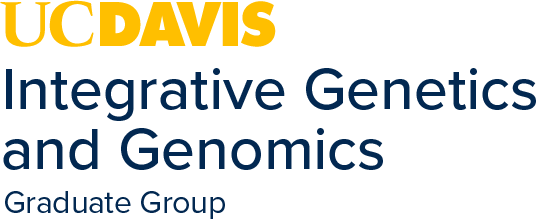Courses
Upon admission, students are assigned a graduate advisor who guides them through the program's formal requirements. The student also chooses a major professor who serves as a mentor and later supervises the dissertation research. Students work with their major professor and graduate adviser to design a course of study that may include courses offered by other graduate programs or departments.
Typical quarter offerings are noted below, but schedules regularly change.
Check Schedule Builder for the most up-to-date offerings.
Core Courses:
GGG 201A - Advanced Genetic Analysis (Fall)
Fundamentals of genetic analysis and chromosome structure using model organisms including mutation, transmission, complementation, suppression, and enhancement as well as epigenetic phenomena at the whole organism and molecular levels.
GGG 201B - Genomics (Winter)
Covers the technological basis of genomics from its historical roots through today's emerging methodologies. Topics include genome structure, physical mapping, sequencing, genome assembly, sequence similarity, gene finding, gene expression, natural variation, proteomics, and metabolomics.
GGG 201D - Quantitative and Population Genetics (Spring)
Basic concepts of quantitative and population genetics including gene and genotypic frequencies, multiple factor hypothesis, phenotypic and genotypic values, heritability, selection, genetic variation, the detection of quantitative trait loci and evolution in populations. Experimental and analytical methods.
GGG 290A - Student Seminar (Spring)
The Graduate Student Conference in Genetics is intended for students in the Genetics Graduate Group to improve presentation skills. Students will give 15-30 minute seminars and receive S/U grading. PhD students will be required to enroll in this course at least one quarter; MS students must enroll at least once.
GGG 291 - History of Genetics (Fall)
The development of modern genetic theories, methods, and logic - from Mendel to the assembled human genome. Student presentations and discussion, based on directed reading of primary literature.
GGG 296 - Scientific Professionalism and Integrity (Fall)
Review of basic skills required of contemporary scientists. Topics include scientific conduct, manuscript preparation, grant writing, seminar presentations, and time management. Emphasis on responsibilities of scientists to factually and thoughtfully communicate results. (S/U grading only.)
Seminar Courses:
GGG 290 - Evolutionary, Developmental & Population Genetics (varies)
GGG 292 - Genomics & Epigenetics (varies)
GGG 293 - Animal Genetics (varies)
GGG 294 - Human Genetics (varies)
GGG 295 - Molecular Genetics (varies)
GGG 297 - Plant Genetics (varies)
Rotation Course:
GGG 205 - Molecular Genetics Laboratory - Laboratory Rotations (Fall and Winter quarters)
Students will conduct experiments in molecular genetics laboratories. Individual research problems will emphasize experimental design, experience with methodologies, and data interpretation. (S/U grading only.)
Elective GGG Courses:
GGG 211 - Concepts in Human Genetics and Genomics (Winter, odd years)
Human genomic organization; genetic structure of human populations; positional cloning of genes for human disease, application of linkage, association, and haplotypes for human studies; quantitative trait loci analyses; integrative genetic studies of gene expression; DNA repair mechanisms in genetic disease; mutation analyses; epigentics in human disease; human mitochondrial DNA disease; gene manipulation and gene therapy.
GGG 220/PLS 220 - Genomics-Based Breeding in Plants and Animals (Fall)
Integration of modern genomics and classical breeding provides an understanding of the individual genes controlling complex traits. This basic understanding of complex trait architecture can be put into practice in marker-based breeding of plants and animals. Introduction to complex trait dissection; QTL mapping; resequencing and SNP discovery; SNP genotyping; nucleotide diversity, population structure and linkage disequilibrium; association mapping; BLUP; estimation of molecular breeding value; genomic selection; backcross breeding.
GGG 225 - Gene and Cellular Therapies (Spring)
Gene therapy from basic concepts to clinical applications. Topics include the human genome and genetic variation, genetic diseases, methods to manipulate gene expression, viral and non-viral delivery vectors, history and progress of gene therapy, case studies, and ethical issues.
GGG 300 - Methods in Teaching Genetics (varies) To be taken during the teaching assistantship quarter.
Practical experience in the methods and problems of teaching genetics. Includes analysis of texts and supporting material, discussion of teaching techniques, preparing for and conducting discussion or laboratory sections, formulating examinations under supervision of instructor. May be repeated for credit up to 3 times or 9 units if teaching in different genetics-related course. (S/U grading only.)
